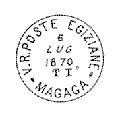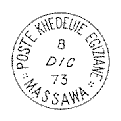When it comes to cancels on stamps of Egypt, the work of R. Seymour Blomfield is the basic catalog for all collectors.
For all cancels in the 'classic era', roughly from 1860 - till the first World War, an extended description is given for regular (postal use) cancels and special cancels.
In this first post, I will start with some of the 12 basic types - regular cancels.
Types I to V have one thing in common, they all have the Italian name of Egypt (Egiziane) on the cancel.
Often however, the key text on the upper part of the cancel, is incomplete or missing.
In this case, the name of the month - also in Italian - can help determinate wheter the cancel is one of the first 5 types or not.
| gennaio | January | luglio |
July |
| febbraio | February | agosto | August |
| marzo |
March | settembre | September |
| aprile |
April | ottobre | October |
| maggio |
May | novembre | November |
| giugno |
June | dicembre | December |
In 1865 Type I was introduced. All cancels have "Poste Vice-Reali Egiziane"
 |
| Type I |
From 1867, Type II was also used, here we find : "Regi Poste Egiziane" - Regi means 'Royal'
 |
| Type II |
Type III
With the introduction of the 3rd type, both Type I and II were used no longer.
Type III has the text : "V.R. Poste Egiziane" - V.R. stands for Vice Reali (Vice-Regal)
 |
| Type III |
 |
| Type III cancel on 1 Piastre - 28 Jan 1875 |
Type IV
In 1873, a 4th cancel type was introduced, along the remaining Type III.
This time, the text is "Poste Khedeuie Egiziane" - Khedivial Post.
This type comes with a single or a double outter ring.
 |
| Type IV - single ring |
Type V
The last type with Italian writings, is type V.
The main text here is (only) "Poste Egiziane". It was issued in around March 1873, till June 1880 - next to types III and IV.
 |
| Type V |
 |
| Type V on 5 paras - 21 Feb 1877 |
Important for this type, is that one of the subtypes (Type V.4) has Arabic text in the middle of the cancel.
The date therefore is in Arabic and not in Latin script.
Those cancels were only used in upper Egypt and the Sudan area. All of those cancels have identical sizes (no matter the amount of text that needed to fit in).
to be continued...
No comments:
Post a Comment